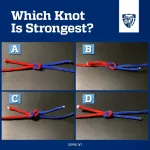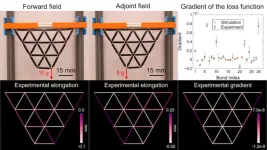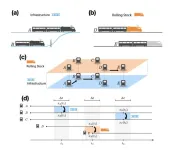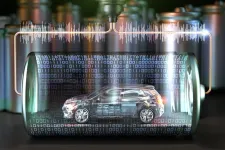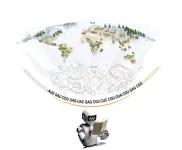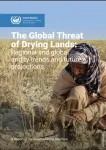(Press-News.org) COLUMBUS, Ohio – If you feel terrible about giving a late gift to a friend for Christmas or their birthday, a new study has good news for you.
Researchers found that recipients aren’t nearly as upset about getting a late gift as givers assume they will be.
“Go ahead and send that late gift, because it doesn’t seem to bother most people as much as givers fear,” said Cory Haltman, lead author of the study and doctoral student in marketing at The Ohio State University’s Fisher College of Business.
In a series of six studies, Haltman and his colleagues explored the mismatch between givers’ and recipients’ beliefs about the importance of a gift being on time. Their paper was published this week in the Journal of Consumer Psychology.
It is not surprising that people worry about giving a late gift. A survey by the researchers found that 65% of Americans believed that if you’re sending an occasion-based gift for a holiday or birthday, the gift should arrive on time.
“A majority of U.S. consumers seem to think that gifts should be given on time – but our study shows that there’s more to the story,” said study co-author Rebecca Reczek, professor of marketing at the Fisher College.
In one study, undergraduate students were asked to imagine giving or receiving a birthday gift of a pint of ice cream that would arrive on time or two weeks late. They were asked to rate how likely that a late gift would have a negative impact on their relationship.
Results showed that those who imagined giving the late gift thought it was more likely to hurt the relationship than did those who imagined receiving the late gift.
Those who imagined giving a gift late put more importance than those receiving the gift on the norm of making sure that you give gifts on time, the study found.
Another study found that participants feared that giving a late gift signaled that they cared less about the gift recipient.
“One of the key social functions of gift giving is to communicate care for the gift recipient, so it is not surprising that people fear a negative impact on their relationship if they are late with their present,” Reczek said.
But that’s not how gift recipients perceived a late gift, Haltman said.
“They didn’t see a late gift as signaling a lack of care. They were more forgiving than those giving late gifts thought they would be,” he said.
The fear of giving a late present even had an impact on what kind of gift people said they would give.
In one study, participants who imagined giving a late gift basket to a friend said they wouldn’t worry as much if they put together a basket of goodies by themselves rather than buying a pre-made basket containing the same items.
“People felt that if they put extra effort into the gift, made it more personalized, that can make up for it being late,” Reczek said.
But even if being late is OK in general, is there such a thing as being too late? The researchers asked participants in one study to imagine giving or receiving a birthday present that was two days late, two weeks late or even two months late. Results showed that both gift givers and gift receivers thought that the later the gift, the more harm that the delay would cause to their relationship.
Still, gift recipients never thought that the relationship harm would be as serious as did the gift givers, no matter how tardy the present.
Beyond even being severely late with a gift, there is one more line to cross: not giving a gift at all. How could that impact a relationship? In another study, findings showed that both givers and receivers thought that not giving a gift would harm a relationship even more than being severely late.
“Late is definitely better than never when it comes to giving a gift,” Haltman said.
It is interesting that the study showed that people in general believe that it is important to give gifts on time – but gift givers thought violating that norm was more serious than gift recipients, the researchers said.
But Reczek noted that everyone will be a gift giver and a gift recipient at various times in their lives.
“If you’re late giving a gift, put yourself in the role of receiving a late gift,” she said. “Based on our results, we believe that should reduce your worry that the lateness is going to be harmful to your relationship.”
The most important rule: “Just make sure you give the gift,” Haltman said.
Other co-authors on the study are Grant Donnelly, assistant professor of marketing at Ohio State, and Atar Herziger of Technion – Israel Institute of Technology.
END
Giving a gift? Better late than never, study finds
Gift givers more worried than recipients about tardiness
2024-12-09
ELSE PRESS RELEASES FROM THIS DATE:
Judging knots throws people for a loop
2024-12-09
We tie our shoes, we put on neckties, we wrestle with power cords. Yet despite deep familiarity with knots, most people cannot tell a weak knot from a strong one by looking at them, new Johns Hopkins University research finds.
Researchers showed people pictures of two knots and asked them to point to the strongest one. They couldn’t.
They showed people videos of each knot, where the knots spin slowly so they could get a good long look. They still failed.
People couldn’t even manage it ...
Not so simple machines: Cracking the code for materials that can learn
2024-12-09
It's easy to think that machine learning is a completely digital phenomenon, made possible by computers and algorithms that can mimic brain-like behaviors.
But the first machines were analog and now, a small but growing body of research is showing that mechanical systems are capable of learning, too. Physicists at the University of Michigan have provided the latest entry into that field of work.
The U-M team of Shuaifeng Li and Xiaoming Mao devised an algorithm that provides a mathematical framework for how learning works in lattices called ...
Finding the weak points: New method to prevent train delay cascades
2024-12-09
[Vienna, 09.12.2024] —Train delays are not only a common frustration for passengers but can also lead to significant economic losses, especially when they cascade through the railway network. When a train is delayed, it often triggers a chain reaction, turning minor issues into widespread delays across the system. This can be costly. A report from the Association of American Railroads (AAR) indicates that a nationwide rail disruption in the US could cost the economy over $2 billion per day. Therefore, the pressing question for railway operators is: How to manage the cascading effect of delays efficiently ...
New AI cracks complex engineering problems faster than supercomputers
2024-12-09
Modeling how cars deform in a crash, how spacecraft responds to extreme environments, or how bridges resist stress could be made thousands of times faster thanks to new artificial intelligence that enables personal computers to solve massive math problems that generally require supercomputers.
The new AI framework is a generic approach that can quickly predict solutions to pervasive and time-consuming math equations needed to create models of how fluids or electrical currents propagate through different ...
Existing EV batteries may last up to 40% longer than expected
2024-12-09
The batteries of electric vehicles subject to the normal use of real world drivers - like heavy traffic, long highway trips, short city trips, and mostly being parked - could last about a third longer than researchers have generally forecast, according to a new study by scientists working in the SLAC-Stanford Battery. Center, a joint center between Stanford University's Precourt Institute for Energy and SLAC National Accelerator Laboratory, This suggests that the owner of a typical EV may not need to replace the expensive battery pack or buy a new car for several additional years.
Almost always, battery scientists and engineers have tested ...
Breakthrough AI model can translate the language of plant life
2024-12-09
A pioneering Artificial Intelligence (AI) powered model able to understand the sequences and structure patterns that make up the genetic “language” of plants, has been launched by a research collaboration.
Plant RNA-FM, believed to be the first AI model of its kind, has been developed by a collaboration between plant researchers at the John Innes Centre and computer scientists at the University of Exeter.
The model, say its creators, is a smart technological breakthrough that can drive discovery and innovation in plant science and potentially across the study of invertebrates ...
MASH discovery redefines subtypes with distinct risks: shaping the future of fatty liver disease treatment
2024-12-09
Metabolic dysfunction-associated steatotic liver disease (MASLD), formerly referred to as nonalcoholic fatty liver disease (NAFLD), impacts roughly 30% of the global adult population. The disease spans from benign fat accumulation in the liver (steatosis) to its more severe form, metabolic dysfunction-associated steatohepatitis (MASH, formerly nonalcoholic steatohepatitis or NASH). MASH represents a dangerous progression, with the potential to cause cirrhosis, liver cancer, type 2 diabetes, and cardiovascular disease.
Despite ...
Three-quarters of Earth’s land became permanently drier in last three decades: UN
2024-12-09
Even as dramatic water-related disasters such as floods and storms intensified in some parts of the world, more than three-quarters of Earth’s land became permanently drier in recent decades, UN scientists warned today in a stark new analysis.
Some 77.6% of Earth’s land experienced drier conditions during the three decades leading up to 2020 compared to the previous 30-year period, according to the landmark report from the UN Convention to Combat Desertification (UNCCD).
Over the same period, drylands expanded by about 4.3 million km2 – an area nearly a third larger than India, the world’s ...
Lower-quality public housing is at high risk of flood damage
2024-12-09
AUSTIN, TX, Dec 09, 2024 – Hurricane Helene highlighted the increasing intensity of extreme weather events and the catastrophic flooding they can bring. A new study finds that many Americans residing in lower-quality public housing face a high risk of experiencing flood-related damages as their homes are disproportionately located in areas of high flood risk.
A study by scientists from the Ohio State University and Texas A&M University has combined HUD’s physical inspection scores of public housing units across the country (from 2013-2020) with ...
Study compares soft tissue sarcoma rates among U.S. military servicemen and men in the general population
2024-12-09
A recent analysis reveals that the incidence rates of soft tissue sarcomas—cancers in muscle, fat, blood vessels, nerves, and tendons—are lower in young U.S. active-duty military servicemen compared with those in the general population, but higher in middle-aged servicemen, perhaps due to greater cumulative exposure to toxins. The findings are published by Wiley online in CANCER, a peer-reviewed journal of the American Cancer Society.
Soft tissue sarcomas are rare cancers arising all over the body, in various organs and tissues such as muscle, fat, and viscera. Most sarcomas arise sporadically, but a small subset arise from exposure to ...
LAST 30 PRESS RELEASES:
Learning makes brain cells work together, not apart
Engineers improve infrared devices using century-old materials
Physicists mathematically create the first ‘ideal glass’
Microbe exposure may not protect against developing allergic disease
Forest damage in Europe to rise by around 20% by 2100 even if warming is limited to 2°C
Rapid population growth helped koala’s recovery from severe genetic bottleneck
CAR-expressing astrocytes target and clear amyloid-β in mouse model of Alzheimer’s disease
Unique Rubisco subunit boosts carbon assimilation in land plants
Climate change will drive increasing forest disturbances across Europe throughout the next century
Enhanced brain cells clear away dementia-related proteins
This odd little plant could help turbocharge crop yields
Flipped chromosomal segments drive natural selection
Whole-genome study of koalas transforms how we understand genetic risk in endangered species
Worcester Polytechnic Institute identifies new tool for predicting Alzheimer’s disease
HSS studies highlight advantages of osseointegration for people with an amputation
Buck Institute launches Healthspan Horizons to turn long-term health data into Actionable healthspan insights
University of Ottawa Heart Institute, the University of Ottawa and McGill University launch ARCHIMEDES to advance health research in Canada
The world’s largest brain research prize awarded for groundbreaking discoveries on how we sense touch and pain
Magnetofluids help to overcome challenges in left atrial appendage occlusion
Brain-clearing cells offer clues to slowing Alzheimer’s disease progression
mRNA therapy restores fertility in genetically infertile mice
Cloaked stem cells evade immune rejection in mice, pointing to a potential universal donor cell line
Growth in telemedicine has not improved mental health care access in rural areas, study finds
Pitt scientists engineer “living eye drop” to support corneal healing
Outcomes of older adults with advanced cancer who prefer quality of life vs prolonging survival
Lower music volume levels in fitness class and perceived exercise intensity
Of crocodiles, counting and conferences
AERA announces 2026 award winners in education research
Saving two lives with one fruit drop
Photonic chips advance real-time learning in spiking neural systems
[Press-News.org] Giving a gift? Better late than never, study findsGift givers more worried than recipients about tardiness
